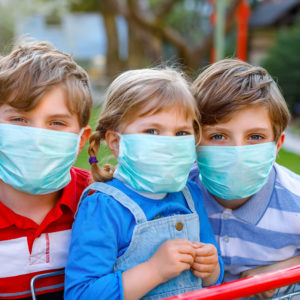As the Delta variant of COVID-19 pushes the number of cases higher, Gov. Tom Wolf has declined to issue a statewide mandate for students were masks in school. He’s left it to local districts, and in the Delaware Valley, several have announced masks will be mandatory, including Upper Merion, Lower Merion, Cheltenham and Philadelphia.
Dr. Kate Cronan MD, a pediatric emergency attending physician at Nemours duPont Hospital for Children, told Delaware Valley Journal she came down on the side of students wearing masks while in school.
“I do think that the people who do have the control of the school should really try to get the kids into school, ” says Dr. Cronan. “They’re not learning quite as well, at home, and there are a lot of distractions. Parents might be working from home, and the kids are missing their friends, they’re missing their teachers, ” she added.
Although Cronan stresses the importance of students being in school with their peers and teachers, she’s also concerned about the possible spread of COVID in school buildings.
“When kids are in school, they want to be with their friends, and they should be, and requiring them to wear a mask is essential, ” says Dr. Cronan. “They have been proven to be very helpful in preventing and sharing germs or bacteria or whatever it may be.”
Schools in disadvantaged communities often are overcrowded, which leads to the inability to social distance, she said. Dr. Cronan emphasizes the importance of mask wearing in those spaces.
“I know there are many overcrowded schools, which makes [mask wearing] a higher priority, because they’re going to be in closer proximity, ” says Dr. Cronan. “If there were not enough masks in the world, I would say the number one place to put the mask on is in really crowded places, but thankfully, masks are pretty available.”
Back to school season coincides with cold and flu season. Although Dr. Cronan isn’t able to predict the mask mandate’s long term impact, she believes it will have a positive impact on students.
“I would think that there may be a movement, but I can’t promise this but that going forward, maybe during flu season, (you) could be asked to wear your mask, ” says Cronan.
“I think the mask could help in the future, even if they get the (flu) shot, but if they want extra protection in crowded places, especially like schools, it might be a good idea just during flu season, because that’s the biggest virus that we have all year, other than COVID,” she added.
This is precisely the trend opponents of mask mandates for children fear. They note that multiple studies have found little spread of the disease among school children, particularly younger ones. One of the largest studies in the U.S. looked at more than 90,000 pupils and teachers in North Carolina over 9 weeks last fall. Rather than the 900 or so cases researchers expected, there were just 32.
There have been more than 1.24 million known cases of COVID-19 (positive tests), fewer than 52,000 among those under the age of ten, or about 4 percent.
And health professionals are beginning to ask questions about the impacts of children wearing masks for months on end, particularly younger children developing speech and communications skills. In a recent editorial in the Wall Street Journal, Dr. Marty Makary, a professor at Johns Hopkins School of Medicine, editor-in-chief of “The Price We Pay,” and Dr. H. Cody Messner, chief of pediatric infectious diseases at Tufts Children’s Hospital who served on the FDA external advisory panel raised the alarm. They also cite the lack of research on the effects of wearing masks on children.
While some children wear masks without problems, others struggle, these doctors note. Masks can lead to increased levels of carbon dioxide in their blood, be “vectors for pathogens” and also cause psychological harm.
“Any child who wants to wear a mask should be free to do so,” Makary and Messner write. “But forcing them to make personal, health and developmental sacrifices for the sake of adults who refuse to get immunized is abusive.”
Still, the push to put children in masks throughout the school day continues. Dr. Cronan acknowledges that asking young children to wear a mask may be difficult. What should parents tell them?
“[You could say] ‘Hey, you wear that mask, you’re actually helping other people. You’re helping yourself, but you’re also helping other people, and that could be your role,’” she said.

